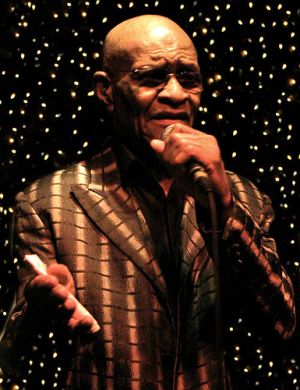Roscoe Robinson
Roscoe Robinson (born 1928 in Dermott, Arkansas) is a gospel and soul singer, best known for a string of soul hits in the 1960s and for his participation in the Blind Boys of Mississippi and the Blind Boys of Alabama gospel groups.
Early life and gospel career
Robinson moved with his family to Gary, Indiana in the 1930s and began singing with local gospel groups as a teenager. He was singing with a group called "Joiner's Five Trumpets" that was groomed by the Quartet Union of Indiana, a chapter of R. H. Harris' National Quartet Association of America. It was through competitions organized through that association that he met Sam Cooke and began going up to Chicago to rehearse with the Highway QCs.
Robinson sang with dozens of groups during the 1950s including the Southern Sons, the Silver Quintette, the Royal Quartet, the Kelly Brothers, the Norfolk Singer, the Fairfield Four, the Gospel Jays and Paramount Singers. Archie Brownlee recruited Robinson to take over for him as one of the Five Blind Boys of Mississippi when he contracted pneumonia. Robinson shared lead vocals in the group with Wilmer "Little Ax" Broadnax. He and Shorty Abrams were dismissed from the group for refusing to participate in a scheme to defraud Chess Records, and castigated for showing loyalty to the white-owned label. The two founded the short-lived "Blind Boys of Ohio" before falling victim to an informal blackballing in the gospel world.
Crossover
Robinson's first "cross over" record was "What Makes a Man Do Wrong", a single on the Tuff label that was distributed by Chess. Disappointed with the label's lackluster promotion he sold his Cadillac and started his own Gerri Records, named for his wife. He recorded the Raven Wildroot song "That's Enough" and released it in 1965. The single was picked up for distribution by Wand Records in 1966 and spent thirteen weeks on the R&B charts, peaking at #7. The follow up single, "How Much Pressure (Do You Think I Can Stand)" also charted after its release in December of that year, but later Wand releases didn't have the same impact. Robinson left the label in 1967 and moved to Nashville where he got involved in producing records with John R.'s Sound Stage 7 label. He scored regional hits with "One Bodillion Years", "Fox Hunting on the Weekend" and "I'm Burning and Yearning (For You)" before leaving Nashville and re-launching his independent Gerri label.
His cover of Fred Hughes' "Oo Wee Baby, I Love You", recorded with Cold Grits at Boutwell Studios, found its way to Atlanta Records which helped push it to #42 on the R&B charts in 1969. That same year Robinson moved to Birmingham and began recording with Neal Hemphill's stable of artists at the Sound of Birmingham studios. He also spent time at Fame Studios in Muscle Shoals, recording the classic "Don't Pretend (Just Be Yourself)" and at Sound City in Shreveport, Louisiana where he recorded "We're Losing it Baby" and other funk singles for Stan Lewis' Paula Records.
Return to gospel
By 1972 Robinson had determined to "cross back over" into gospel music. Lewis accommodated him with by producing the classic "He Still Lives in Me" which became Robinson's debut on the Jewel Label. He followed that with a few releases on the Gospel Roots label, including a re-casting of his secular hit "That's Enough" as "Jesus is Enough". In 1979 he joined the Five Blind Boys of Alabama and co-produced that legendary group's 1982 album I'm A Soldier in the Army of the Lord. A solo album, High on Jesus followed in 1983 on the Savoy label, where Robinson was producing other artists.
Later career and honors
Robinson has continued to perform regularly. He released an album of secular standards in 1998, which was followed in 2005 with another Gerri Records release, The Gospel Stroll.
Robinson was inducted into the Birmingham Record Collectors Hall of Fame in 2005. As a member of the Blind Boys of Mississippi and the Blind Boys of Alabama he has twice been inducted into the Gospel Quartet Hall of Fame. Two of his unreleased tracks appeared on the 2006 compilation The Birmingham Sound: The Soul of Neal Hemphill, Vol. 1.
Album discography
- Roscoe Robinson (1973) He Still Lives in Me. Jewel Records
- Roscoe Robinson (1977) Time to Live. Gospel Roots Records
- Roscoe Robinson (1983) High on Jesus. Savoy Records
- Roscoe Robinson (1998) Roads and Rails. Gerri Records
- Roscoe Robinson (2004) The Gospel Stroll. Gerri Records (reissued as So Called Friends on Sound Mindz Records)
References
- Kelly, Red (March 18, 2007) "Roscoe Robinson - We're Losing It Baby (Paula 378)" The "A" Side
- Kelly, Red (March 18, 2007) "Roscoe Robinson - How Many Times Must I Knock (Sound Stage 7 2618)" The "B" Side
- Kelly, Red (March 18, 2007) "Original Five Blind Boys - Lord, Lord You've Been So Good To Me (Peacock 1824)" Holy Ghost
External links
- Roscoe Robinson on MySpace.com
- Roscoe Robinson BRC Hall of Fame bio
- Roscoe Robinson interview and music on Tapestry.
- Roscoe Robinson interview with Soul Portrait
- Roscoe Robinson discography at Soulful Kinda Music
